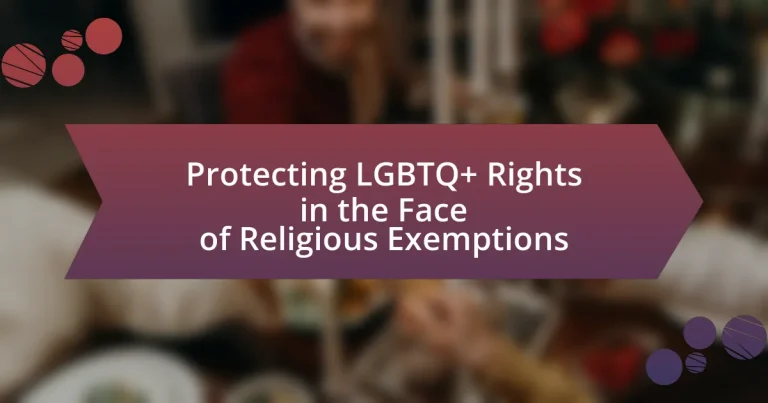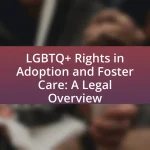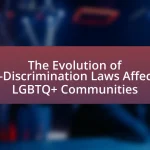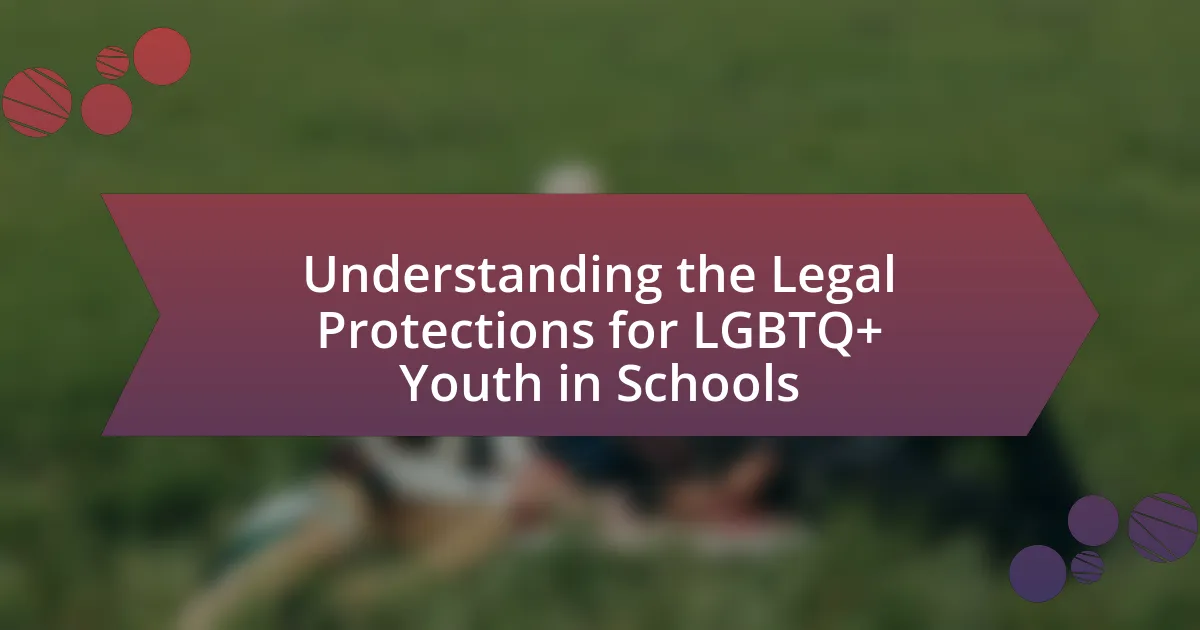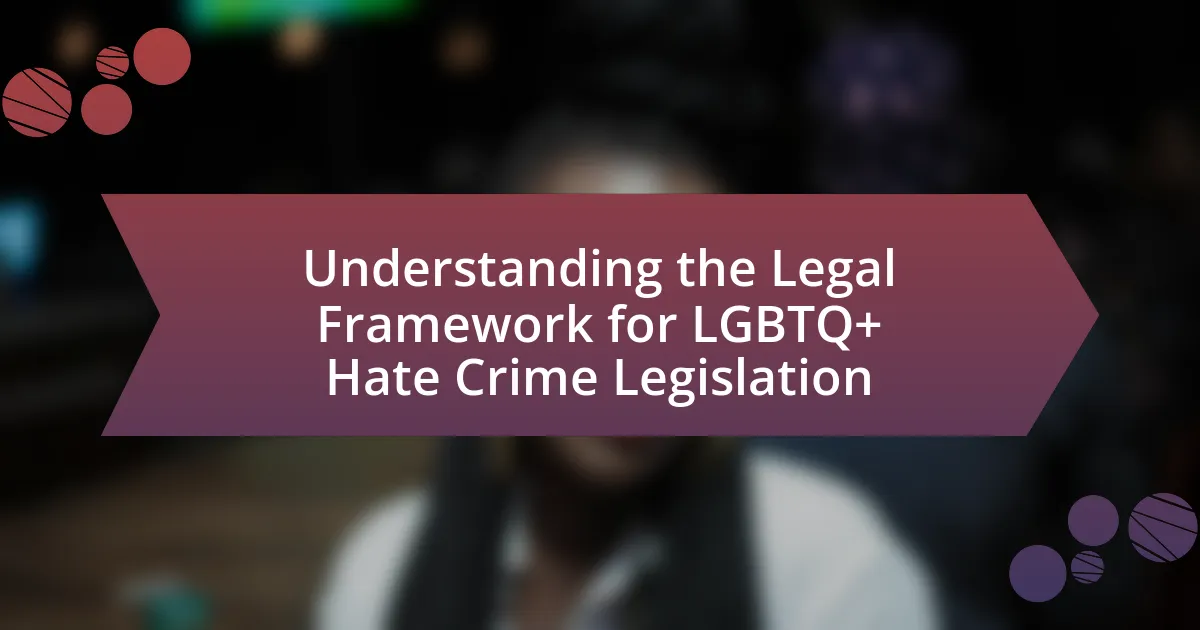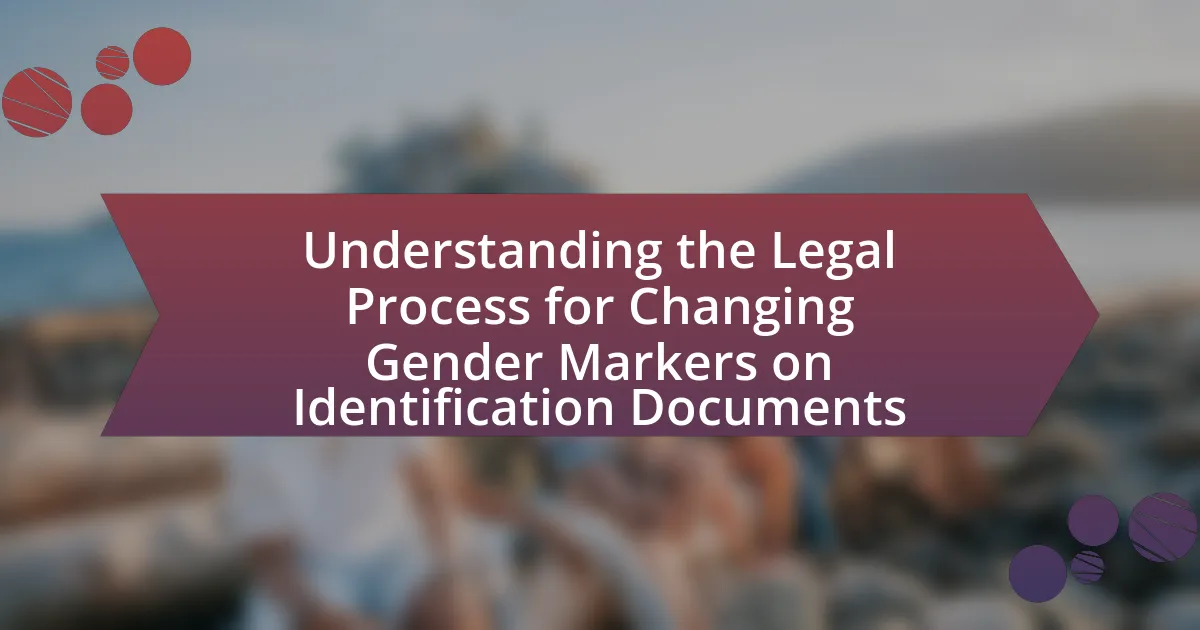LGBTQ+ rights encompass the legal and social entitlements that protect individuals identifying as lesbian, gay, bisexual, transgender, queer, or other sexual and gender minorities. This article examines the significance of these rights in promoting equality and preventing discrimination, while also addressing the intersection of LGBTQ+ rights with human rights. It highlights specific rights included under LGBTQ+ protections, the challenges faced by individuals due to legal barriers and societal attitudes, and the implications of religious exemptions that allow discrimination. Additionally, the article discusses effective legal and social strategies to advocate for LGBTQ+ rights amidst these challenges, emphasizing the role of community engagement and education in fostering inclusivity.

What are LGBTQ+ Rights and Why are They Important?
LGBTQ+ rights are the legal and social entitlements that protect individuals who identify as lesbian, gay, bisexual, transgender, queer, or other sexual and gender minorities. These rights are important because they ensure equality, prevent discrimination, and promote the dignity and well-being of LGBTQ+ individuals. For instance, the legalization of same-sex marriage in numerous countries, including the United States in 2015, exemplifies a significant advancement in LGBTQ+ rights, affirming the right to marry regardless of sexual orientation. Furthermore, studies show that legal protections against discrimination in employment and housing lead to improved mental health outcomes for LGBTQ+ individuals, highlighting the necessity of these rights for fostering inclusive societies.
How do LGBTQ+ rights intersect with human rights?
LGBTQ+ rights are a fundamental aspect of human rights, as they encompass the right to live free from discrimination, violence, and persecution based on sexual orientation and gender identity. The Universal Declaration of Human Rights, adopted by the United Nations in 1948, asserts that all individuals are entitled to the same rights and freedoms without distinction of any kind, including sexual orientation. This intersection is evident in various international human rights treaties, such as the International Covenant on Civil and Political Rights, which obligates states to respect and ensure the rights of all individuals, including LGBTQ+ persons. Furthermore, numerous countries have recognized LGBTQ+ rights through legal frameworks that protect against discrimination and promote equality, reinforcing the notion that human rights are universal and inclusive.
What specific rights are included under LGBTQ+ rights?
LGBTQ+ rights encompass specific rights such as the right to marry, the right to adopt children, the right to be free from discrimination in employment and housing, and the right to access healthcare without discrimination. These rights are supported by legal frameworks like the Obergefell v. Hodges decision, which legalized same-sex marriage in the United States, and various anti-discrimination laws that protect individuals based on sexual orientation and gender identity. Additionally, the Equality Act aims to provide comprehensive protections against discrimination for LGBTQ+ individuals in various sectors, reinforcing the necessity of these rights in promoting equality and justice.
Why is the recognition of LGBTQ+ rights crucial for society?
The recognition of LGBTQ+ rights is crucial for society because it promotes equality, reduces discrimination, and fosters social cohesion. When LGBTQ+ individuals are granted equal rights, it leads to a more inclusive environment where diversity is celebrated, contributing to overall societal well-being. Studies, such as those conducted by the Williams Institute, show that legal recognition of LGBTQ+ rights correlates with improved mental health outcomes and reduced rates of suicide among LGBTQ+ youth. Furthermore, societies that embrace LGBTQ+ rights often experience economic benefits, as inclusivity attracts talent and tourism, enhancing community prosperity.
What challenges do LGBTQ+ individuals face in relation to their rights?
LGBTQ+ individuals face significant challenges in relation to their rights, primarily due to discrimination and legal inequalities. Many jurisdictions lack comprehensive anti-discrimination laws that protect LGBTQ+ individuals in areas such as employment, housing, and public accommodations. For instance, a 2021 report by the Human Rights Campaign indicated that 29 states in the U.S. do not have laws prohibiting discrimination based on sexual orientation or gender identity. Additionally, religious exemptions often allow individuals and organizations to refuse services to LGBTQ+ people, further exacerbating their vulnerability. This legal landscape creates an environment where LGBTQ+ individuals may experience harassment, violence, and social stigma, undermining their rights and well-being.
How do societal attitudes impact LGBTQ+ rights?
Societal attitudes significantly impact LGBTQ+ rights by influencing public policy, legal frameworks, and social acceptance. Positive societal attitudes often lead to the enactment of laws that protect LGBTQ+ individuals from discrimination, as seen in countries like Canada and the Netherlands, where public support for LGBTQ+ rights has resulted in comprehensive anti-discrimination legislation and marriage equality. Conversely, negative societal attitudes can perpetuate discrimination and hinder progress, as evidenced by the lack of legal protections in regions with high levels of homophobia, such as parts of Eastern Europe and Africa. Research from the Williams Institute indicates that increased acceptance correlates with improved mental health outcomes for LGBTQ+ individuals, further demonstrating the critical role societal attitudes play in shaping the rights and well-being of this community.
What legal barriers exist for LGBTQ+ individuals seeking equality?
Legal barriers for LGBTQ+ individuals seeking equality include discriminatory laws, lack of comprehensive anti-discrimination protections, and religious exemptions that allow for the denial of services based on sexual orientation or gender identity. For instance, in many U.S. states, there are no explicit laws prohibiting discrimination in employment, housing, or public accommodations based on sexual orientation or gender identity, leaving LGBTQ+ individuals vulnerable to bias. Additionally, the Religious Freedom Restoration Act and similar laws in various jurisdictions permit individuals and organizations to refuse services to LGBTQ+ individuals on religious grounds, further entrenching inequality. These legal frameworks create significant obstacles for LGBTQ+ individuals in achieving full equality and protection under the law.

What are Religious Exemptions and How Do They Affect LGBTQ+ Rights?
Religious exemptions are legal provisions that allow individuals or organizations to refuse compliance with certain laws based on their religious beliefs. These exemptions can significantly affect LGBTQ+ rights by enabling discrimination under the guise of religious freedom. For instance, in the United States, various state laws permit businesses and service providers to deny services to LGBTQ+ individuals if doing so conflicts with their religious convictions, as seen in cases like Masterpiece Cakeshop v. Colorado Civil Rights Commission. This legal framework can undermine anti-discrimination protections, leading to unequal treatment and limiting access to essential services for LGBTQ+ individuals.
What is the legal basis for religious exemptions?
The legal basis for religious exemptions primarily stems from the First Amendment of the United States Constitution, which guarantees the free exercise of religion. This constitutional protection allows individuals and organizations to seek exemptions from laws that conflict with their religious beliefs. Additionally, various federal and state laws, such as the Religious Freedom Restoration Act (RFRA) of 1993, provide a framework for individuals to claim religious exemptions by requiring that any government action that substantially burdens religious exercise must be justified by a compelling governmental interest and must be the least restrictive means of furthering that interest. Courts have upheld these principles in numerous cases, reinforcing the legal foundation for religious exemptions in contexts that include employment, healthcare, and public accommodations.
How do different countries define religious exemptions?
Different countries define religious exemptions in various ways, often influenced by their legal frameworks and cultural contexts. For instance, in the United States, religious exemptions allow individuals and organizations to refuse compliance with certain laws, such as anti-discrimination statutes, based on their religious beliefs, as established by the Religious Freedom Restoration Act of 1993. In contrast, Canada’s approach emphasizes balancing religious freedom with equality rights, as seen in the Canadian Charter of Rights and Freedoms, which permits religious exemptions but requires that they do not infringe upon the rights of others, particularly marginalized groups. Similarly, in the United Kingdom, religious exemptions are recognized under the Equality Act 2010, allowing religious organizations to act in accordance with their beliefs, but with limitations to ensure protection against discrimination. These definitions reflect each country’s attempt to navigate the complex interplay between religious freedom and the protection of individual rights, particularly for LGBTQ+ individuals.
What are the implications of these exemptions for LGBTQ+ individuals?
The implications of these exemptions for LGBTQ+ individuals include potential discrimination and reduced access to essential services. When religious exemptions are granted, businesses and organizations may refuse service based on sexual orientation or gender identity, undermining protections established by laws such as the Civil Rights Act. For instance, a 2020 report by the Williams Institute found that 27% of LGBTQ+ individuals experienced discrimination in public accommodations, highlighting the real-world impact of such exemptions. These legal allowances can perpetuate a culture of exclusion, leading to increased marginalization and mental health challenges within the LGBTQ+ community.
How do religious beliefs influence the debate on LGBTQ+ rights?
Religious beliefs significantly influence the debate on LGBTQ+ rights by shaping moral perspectives and legislative actions. Many religious groups view LGBTQ+ identities and relationships as incompatible with their doctrines, leading to opposition against legal protections for LGBTQ+ individuals. For instance, certain interpretations of Christianity, Islam, and Judaism advocate for traditional definitions of marriage and family, which often exclude same-sex couples. This opposition manifests in various forms, including lobbying against anti-discrimination laws and advocating for religious exemptions that allow individuals and organizations to refuse services to LGBTQ+ people based on their beliefs. Research from the Pew Research Center indicates that religious affiliation correlates with attitudes toward LGBTQ+ rights, with more religious individuals often holding less supportive views. Thus, religious beliefs play a crucial role in both public opinion and policy-making regarding LGBTQ+ rights.
What arguments do religious groups use to justify exemptions?
Religious groups justify exemptions primarily by invoking the principle of religious freedom, arguing that their beliefs should be protected under the First Amendment of the U.S. Constitution. They assert that these exemptions allow them to practice their faith without government interference, particularly in matters related to marriage, family, and sexuality. For instance, many religious organizations claim that adhering to their doctrines regarding marriage and sexual orientation is essential to their identity and mission. This argument is often supported by legal precedents, such as the Supreme Court’s decision in Burwell v. Hobby Lobby Stores, Inc., which recognized the rights of closely held corporations to refuse to provide contraceptive coverage based on religious objections.
How do these beliefs conflict with LGBTQ+ rights advocacy?
Beliefs rooted in traditional religious doctrines often conflict with LGBTQ+ rights advocacy by prioritizing religious freedom over the rights of individuals to express their sexual orientation and gender identity. For instance, many religious groups assert that their beliefs dictate opposition to same-sex marriage and LGBTQ+ relationships, which can lead to discriminatory practices against LGBTQ+ individuals in areas such as employment, housing, and public services. This conflict is evident in legal cases where religious exemptions are invoked to justify actions that deny equal treatment to LGBTQ+ persons, undermining the principles of equality and non-discrimination that LGBTQ+ rights advocacy seeks to uphold.

What Strategies Can Be Employed to Protect LGBTQ+ Rights Against Religious Exemptions?
To protect LGBTQ+ rights against religious exemptions, legal strategies such as advocating for comprehensive anti-discrimination laws are essential. These laws can explicitly prohibit discrimination based on sexual orientation and gender identity, thereby limiting the scope of religious exemptions. For instance, the Equality Act, proposed in the U.S. Congress, aims to amend the Civil Rights Act to include protections for LGBTQ+ individuals, demonstrating a legislative approach to counteract religious exemptions that allow discrimination. Additionally, public awareness campaigns can educate communities about the importance of LGBTQ+ rights and the potential harms of broad religious exemptions, fostering a more inclusive societal attitude. Legal challenges in courts can also be employed to contest the validity of religious exemptions when they infringe upon established civil rights, as seen in cases like Masterpiece Cakeshop v. Colorado Civil Rights Commission, which highlighted the tension between religious freedom and anti-discrimination laws.
What legal strategies are effective in challenging religious exemptions?
Effective legal strategies for challenging religious exemptions include invoking anti-discrimination laws, arguing for a compelling state interest, and utilizing the Establishment Clause of the First Amendment. Anti-discrimination laws, such as the Civil Rights Act, can be leveraged to demonstrate that religious exemptions lead to discrimination against LGBTQ+ individuals. Courts have historically upheld the need for a compelling state interest when evaluating religious exemptions, as seen in cases like Employment Division v. Smith, where the Supreme Court emphasized that neutral laws of general applicability can limit religious practices if they serve a significant governmental interest. Additionally, the Establishment Clause can be argued to prevent the government from favoring one religion over another, thereby reinforcing the need for equal treatment under the law. These strategies have been effective in various legal challenges, including cases involving wedding vendors and healthcare providers who refuse services based on religious beliefs.
How have courts ruled on cases involving LGBTQ+ rights and religious exemptions?
Courts have generally ruled in favor of LGBTQ+ rights while scrutinizing claims for religious exemptions. For instance, in the 2018 case Masterpiece Cakeshop v. Colorado Civil Rights Commission, the U.S. Supreme Court ruled narrowly, emphasizing the need for neutrality in adjudicating cases involving religious beliefs and LGBTQ+ rights, but did not create a broad precedent for religious exemptions. Additionally, lower courts have upheld anti-discrimination laws that protect LGBTQ+ individuals, often rejecting arguments that religious beliefs justify discrimination. This trend reflects a judicial commitment to balancing religious freedoms with the protection of LGBTQ+ rights, as seen in various rulings across different jurisdictions.
What role do advocacy groups play in this context?
Advocacy groups play a crucial role in protecting LGBTQ+ rights by mobilizing public support, influencing policy, and providing legal assistance. These organizations, such as the Human Rights Campaign and Lambda Legal, actively campaign against discriminatory practices that arise from religious exemptions, ensuring that LGBTQ+ individuals receive equal treatment under the law. For instance, advocacy groups have successfully lobbied for legislation that limits the scope of religious exemptions, thereby safeguarding the rights of LGBTQ+ individuals in various sectors, including employment and healthcare. Their efforts are supported by research indicating that states with strong advocacy presence tend to have more comprehensive protections for LGBTQ+ rights, demonstrating the effectiveness of these organizations in shaping a more equitable legal landscape.
What social strategies can help promote LGBTQ+ rights despite religious exemptions?
Social strategies that can promote LGBTQ+ rights despite religious exemptions include advocacy for inclusive policies, community engagement, and public awareness campaigns. Advocacy for inclusive policies involves lobbying for legislation that protects LGBTQ+ individuals from discrimination, regardless of religious beliefs, as seen in the Equality Act proposed in the United States, which aims to extend civil rights protections. Community engagement fosters solidarity through partnerships with diverse organizations, creating coalitions that amplify LGBTQ+ voices and concerns. Public awareness campaigns educate the broader population about LGBTQ+ issues and the impact of religious exemptions, utilizing data from studies like the Human Rights Campaign’s annual report, which highlights the discrimination faced by LGBTQ+ individuals. These strategies collectively work to challenge discriminatory practices and promote equality.
How can community engagement foster support for LGBTQ+ rights?
Community engagement can foster support for LGBTQ+ rights by creating inclusive environments that encourage dialogue and understanding. When communities actively involve diverse voices, including those from LGBTQ+ individuals, they promote awareness of the challenges faced by this group. Research indicates that increased visibility and representation lead to greater acceptance; for instance, a study by the Williams Institute found that personal connections to LGBTQ+ individuals significantly increase support for LGBTQ+ rights. Engaging community members through events, educational programs, and advocacy initiatives helps dismantle stereotypes and fosters empathy, ultimately leading to stronger support for policies that protect LGBTQ+ rights.
What educational initiatives can raise awareness about LGBTQ+ issues?
Educational initiatives that can raise awareness about LGBTQ+ issues include comprehensive school curricula that incorporate LGBTQ+ history, anti-bullying programs that specifically address discrimination based on sexual orientation and gender identity, and workshops that promote inclusivity and understanding among students. Research indicates that inclusive education can significantly reduce bullying and improve the mental health of LGBTQ+ youth; for example, a study published in the Journal of School Health found that schools with inclusive curricula reported lower rates of harassment and higher levels of acceptance among students. Additionally, community outreach programs that engage parents and local organizations can further enhance awareness and support for LGBTQ+ rights, fostering a more inclusive environment.
What are best practices for advocating LGBTQ+ rights in the face of religious exemptions?
Best practices for advocating LGBTQ+ rights in the face of religious exemptions include promoting inclusive policies, engaging in dialogue with religious communities, and leveraging legal frameworks to protect rights. Advocates should work to create policies that explicitly prohibit discrimination based on sexual orientation and gender identity, ensuring that these protections are upheld even in contexts where religious exemptions are claimed. Engaging in constructive conversations with religious leaders can help bridge gaps and foster understanding, potentially leading to more supportive stances within faith communities. Additionally, utilizing existing legal protections, such as the Equality Act in the United States, can provide a strong basis for challenging discriminatory practices justified by religious beliefs. These strategies are supported by research indicating that inclusive policies and community engagement can lead to greater acceptance and protection of LGBTQ+ rights.
